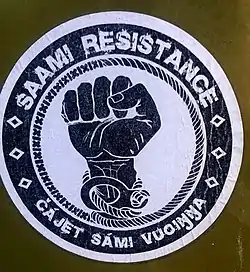
ČSV is an initialism used to promote Sámi identity and activism. The three letters are the most commonly used in Sámi languages, and together they can stand for a variety of phrases, although the most common modern meaning is Čájet Sámi Vuoiŋŋa! (Show Sámi Spirit).
History
In the early 1970s, Sámi activists adopted ČSV as a watchword similar to how the American Indian Movement and the Black Panthers used the phrases "Red Power" and "Black Power" respectively.[1] ČSV did not represent a group, but more of an idea that minority groups should take a more confrontational stance in demanding change.
Johan Jernsletten is credited with coming up with the purposefully vague acronym during the protests in Máze, Norway in 1970, saying that it stood for Čiegus Sámi Viehka (Secret Sámi Helper).[2] Although the phrase originated among the Northern Sámi community in Finnmark, Norway, it soon spread across Sápmi and to other Sámi language groups.[3][4]
In general, someone who works actively to support the Sámi community has been referred to a ČSV.[5] As an ethnocultural movement, ČSV has been associated with a certain style, including wearing gáktis, nutukas, tin-thread embroidery, and the Sami colors,[6] as one of the goals of ČSV is to make Sámi culture and identity visible.[7]
Artists
While the origin of ČSV was political, it soon became a cultural identifier drawing the attention of authors and artists.[3][8] In 1972, participants at a Sirma, Norway, cultural seminar to promote Sámi literature were tasked with writing what ČSV meant for them as part of an exercise to encourage Sámi to write about Sámi experiences.[9] The literary anthology Čállagat launched out of this seminar, publishing 16 issues and featuring many first-time Sámi authors. A number of issues of Čállagat featured poems with words containing the letters ČSV.[10]
In 2013, Kildin Sámi photographer Sergey Gavrilov asked Sámi youth to repeat the ČSV exercise for an exhibition at the Sami Center for Contemporary Art in Kárášjohka, Norway.[11] In 2014, the play ČSV-Republihkka explored the idea of a unified, independent Sápmi and how different Sámi communities and languages might engage with one another and the world.[12]
Interpretation
Expressing the meaning of ČSV for many is an exercise in creativity, demonstrating the adaptability of the Sámi people and languages.[2] Common meanings include:[13]
- Čájet Sámi Vuoiŋŋa! (Show Sámi Spirit!)
- Čohkke Sámiid Vuitui! (Sámi Unite for Victory!)
- Čállet Sámi Verddet! (Write, Sámi friends!)
References
- ↑ Minde, Henry (2003). "The Challenge of Indigenism". In Jentoft, Svein; Minde, Henry; Nilsen, Ranger (eds.). Indigenous Peoples: Resource Management and Global Rights: 7th Circumpolar Universities Cooperation Conference. Delf, Netherlands: Eburon Uitgeverij B.V. p. 90. ISBN 978-90-5166-978-7. Retrieved 5 April 2020 – via Google Books.
- 1 2 DuBois, Thomas A.; Cocq, Coppélie (2019). Sámi Media and Indigenous Agency in the Arctic North. Seattle, Washington: University of Washington Press. ISBN 978-0-295-74661-6. Retrieved 5 April 2020 – via Google Books.
- 1 2 Kalstad, Johan Klemet Hætta. "ČSV – sámi nationalisttaid dahje sámenašuvnna doaimmalaččaid muitun". Sámi Dieđalaš Áigečála (in Northern Sami). 2013 (1): 29–48. Retrieved April 5, 2020.
- ↑ Lundström, Jan-Erik (2014). "Decades of Change: Visual Arts in Finnmark, Norway in the 1970s and 1980s". In Katajamäki, Jonna (ed.). Northern Beauty: Barents Visual Arts in the 1970s and the 1980s (PDF). Rovaniemi, Finland: University of Lapland. pp. 93–113. ISBN 978-952-484-744-5. Retrieved 25 May 2021.
- ↑ Hætta, Mathis (5 January 2012). "Vi trenger nye ČSV-ere" [We need new ČSVs]. NRK Sápmi (in Norwegian). Kárášjohka, Norway. Retrieved 10 July 2020.
- ↑ Hernes, Maria (2007). Being Sami Enough: Increasing the Sami Stage of Performance (PDF) (MA). University of Oslo. Retrieved 28 April 2020.
- ↑ Dankertsen, Astri (2016). "Fragments of the future. Decolonization in Sami everyday life". Kult. Roskilde Universitet (14): 29. Retrieved 2023-01-15.
- ↑ Mathisen, Hans Ragnar. "ČSV. Čájet Sámi Vuoiŋŋa! A look at one of the most important symbols of Sámi revitalization in the early 1970s". Retrieved April 5, 2020.
- ↑ Frederiksen, Lill Tove (October 1, 2019). "A brief history of Sámi literature". Aarhus, Denmark: nordics.info. Retrieved April 5, 2020.
- ↑ Domokos, Johanna (2018). A Writing Hand Reaches Further: "Čálli giehta ollá guhkás" — Recommendations for the improvement of the Sámi literary field. Helsinki, Finland: Culture for All Service. ISBN 9789526677422.
- ↑ "ČSV: A Few Thoughts". Kárášjohka, Norway: Sámi Dáiddaguovddás. 13 September 2013. Retrieved April 5, 2020.
- ↑ Johansen, Siri Broch (August 2014). "ČSV Republihkain Sámis Johtit" [ČSV Republic Moves from Sápmi] (PDF). Sámis (in Northern Sami). No. 15. Kárášjohka, Norway. pp. 18–24. ISSN 0809-7410. Retrieved 19 July 2020.
- ↑ Kuhn, Gabriel (2020). Liberating Sápmi: Indigenous Resistance in Europe's Far North. Oakland, California: PM Press. ISBN 978-1-62963-779-2 – via Google Books.